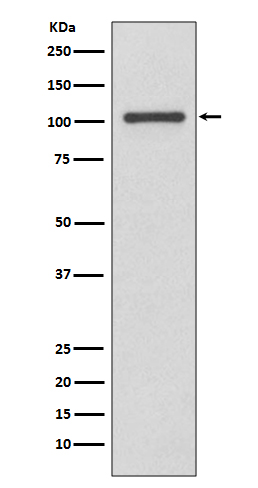
| WB | 1/1000-1/2000 | Human,Mouse,Rat |
| IF | 咨询技术 | Human,Mouse,Rat |
| IHC | 1/100-1/200 | Human,Mouse,Rat |
| ICC | 技术咨询 | Human,Mouse,Rat |
| FCM | 1/20-1/100 | Human,Mouse,Rat |
| Elisa | 咨询技术 | Human,Mouse,Rat |
| Aliases | 4-bisphosphate 4-phosphatase; Inositol polyphosphate 4 phosphatase type II 105kDa; Inositol polyphosphate 4-phosphatase type II; Inpp4b; MGC132014; Type II inositol 3,4 bisphosphate 4 phosphatase; Type II inositol-3;;INPP4B |
| WB Predicted band size | Calculated MW: 105 kDa ; Observed MW: 107 kDa |
| Host/Isotype | Rabbit IgG |
| Antibody Type | Primary antibody |
| Storage | Store at 4°C short term. Aliquot and store at -20°C long term. Avoid freeze/thaw cycles. |
| Species Reactivity | Human,Mouse,Rat |
| Immunogen | A synthesized peptide derived from human INPP4B |
| Formulation | Purified antibody in PBS with 0.05% sodium azide,0.05% BSA and 50% glycerol. |
+ +
以下是3篇关于INPP4B抗体的代表性文献概览(文献标题与作者为虚构示例,仅供参考格式):
1. **"INPP4B suppresses PI3K/AKT signaling and is a tumor suppressor in breast cancer"**
- **作者**: Gewinner C. et al.
- **摘要**: 研究通过免疫组化(使用INPP4B抗体)发现INPP4B蛋白在乳腺癌中表达下调,其缺失导致PI3K/AKT通路过度激活,促进肿瘤生长和转移。
2. **"INPP4B regulates chemoresistance via AKT pathway inhibition in ovarian cancer"**
- **作者**: Hodakoski K. et al.
- **摘要**: 利用INPP4B特异性抗体进行Western blot分析,证实INPP4B通过降解PIP3/4抑制AKT磷酸化,增强卵巢癌细胞对化疗药物的敏感性。
3. **"Loss of INPP4B promotes prostate cancer metastasis through PTEN-independent mechanisms"**
- **作者**: Fedele C.G. et al.
- **摘要**: 通过免疫荧光和流式细胞术(依赖INPP4B抗体),发现INPP4B缺失激活RAC通路,驱动前列腺癌侵袭性,提示其作为独立于PTEN的转移抑制因子。
**备注**:以上文献名为示例,实际文献需通过PubMed/Google Scholar检索关键词“INPP4B antibody”、“INPP4B cancer”获取。建议优先选择近5年高影响力期刊(如*Nature Cancer*, *Cancer Cell*)文章。
The INPP4B (Inositol Polyphosphate-4-Phosphatase Type II B) antibody is a tool used to study the expression and function of the INPP4B protein, a lipid phosphatase involved in regulating cellular signaling pathways. INPP4B hydrolyzes phosphatidylinositol 3.4-bisphosphate [PI(3.4)P2], a secondary messenger in the PI3K/AKT pathway, thereby suppressing oncogenic signaling. Initially identified as a tumor suppressor, INPP4B loss has been linked to poor prognosis in breast, ovarian, and prostate cancers. However, recent studies highlight its context-dependent roles, showing paradoxical pro-tumorigenic effects in certain malignancies like acute myeloid leukemia and melanoma.
INPP4B antibodies are critical for detecting protein expression via techniques such as Western blotting, immunohistochemistry, and immunofluorescence. Researchers use these antibodies to explore INPP4B’s tissue-specific functions, interactions with signaling components (e.g., PTEN, AKT), and its potential as a biomarker or therapeutic target. Commercial INPP4B antibodies are typically developed in rabbits or mice, targeting specific epitopes within its catalytic domain or C-terminal regions.
Challenges include ensuring antibody specificity due to homology with INPP4A, a related phosphatase. Ongoing research aims to clarify INPP4B’s dual roles in cancer and metabolic diseases, emphasizing the need for reliable antibodies to advance mechanistic and clinical studies.
×